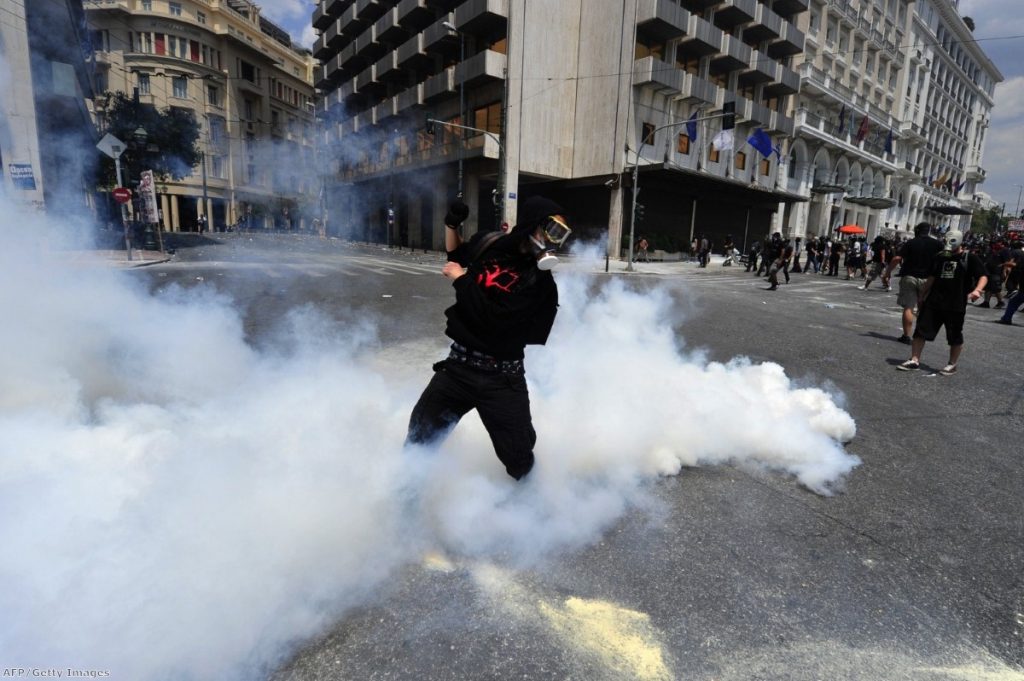War of austerity: Athens riots as Cameron pleads
By Ian Dunt Follow @IanDunt
David Cameron is issuing a plea to workers not to strike today, as riots in Greece demonstrate the extent of the opposition to austerity measures in Europe.
The prime minister's last-minute plea ahead of Thursday's industrial action was delivered at the same moment as education secretary Michael Gove stood in the Commons to urge teachers not to join the strike, calling it "unnecessary, premature and destructive".
Mr Cameron said: "To those considering strike action, at a time when discussions are ongoing, I would say to you: these strikes are wrong – for you, for the people you serve, for the good of the country. It's the changes we propose which are right.


"Many of us have been looking at the television screens looking at what is happening in Greece. Let's be clear – this year, our budget deficit is worse than the budget deficit in Greece."
Eyewitness reports suggest police in Athens have fired an unprecedented amount of tear gas at rioters as hundredsof thousands of people take to the streets to voice their opposition to austerity measures going through the Greek parliament.
For the first time since the debt crisis began, police managed to move protestors from Syntagma Square, but only through brutal tactics which caused widespread respiratory problems.
The protest, which comes at the start of a two-day general strike, then saw clashes outside the finance ministry, with the two sides trading smoke grenades for teargas.
The Greek parliament votes tomorrow on the austerity measures, which would open the door to a further 12 billion euros of EU and IMF loans, without which the country could run out of money within weeks.
If the measures do not pass, Greece could be the first country to default on its loans and quit the eurozone, triggering a continent-wide political convulsion.
But even Mervyn King, chancellor of the Bank of England, seemed unconvinced that a further bailout would help.
"If the underlying problems have not changed, the crisis comes back in an even more severe form," he said this morning.
"And that has been the case right through the past 18 months in trying to deal with Greece, Portugal and Ireland, and indeed in the problems for the euro area as a whole, which is why I say that there are dangers in just buying time, because if you forget the problem and say 'well thank goodness, that's gone away for a few weeks', that could be a very dangerous attitude."
Spanish protests continue to build until a major rally in Madrid on July 24th, but regular marches in the Mediterranean country's major cities are now attracting hundreds of thousands of attendants.
Barcelona saw tens of thousands take to the streets over the weekend in a show of force ahead of next month's action, as workers demonstrated against cuts to jobs, services and welfare.
Meanwhile, France watched as over 100 demonstrators were arrested earlier this month during a march against pension reforms and public sector cuts in Paris.
Britain's strike on Thursday also concerns public sector pensions, as opposed to broader austerity measures, but with up to 750,000 teachers and workers preparing to walk out the government has reacted with alarm at the breadth of the action.
A massive march will wind its way through central London to the Houses of Parliament on Thursday, as National Union of Teachers (NUT) members come to lobby their MPs.
Vince Cable warned unions that he was under pressure from business and other Cabinet-level politicians to write up new anti-strike laws, probably in the form of a minimum voting threshold, during the GMB union conference earlier this month.
The business secretary is thought to be a voice of moderation on the subject in Cabinet. Other colleagues, reportedly including the prime minister, are more hawkish.
Talks between trade unions and Danny Alexander, chief secretary to the Treasury, and Francis Maude, Cabinet Office minister, collapsed yesterday, with PCS union general secretary Mark Serwotka calling it a "farce".
"Again the government has shown no interest in actually negotiating on any of the key principles at the heart of this dispute," he said.
Government statements revealed that some compromise had been reached, however, with a recognition that the local government pension scheme should have a different funding basis.
"We have agreed to have a more in-depth discussion with local government unions and the TUC about how we take these factors into account," the government team said.
There has been no movement at all on the teachers' strike, which is expected to close 17,000 schools in England, including 85% of England's primary and secondary schools.
Millions of children are expected to be affected. Government pleas for parents to help with the running of schools served to increase the anger of unions and prompted exasperation among mothers on internet messaging boards.

